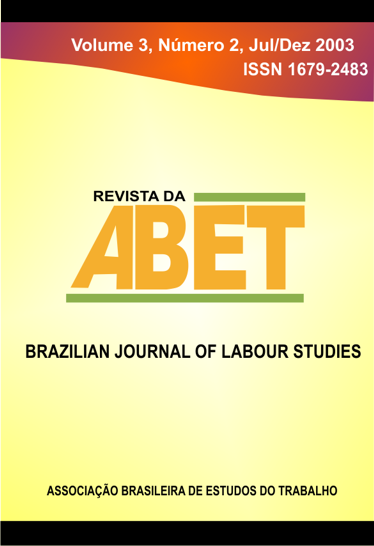RELAÇÕES DE TRABALHO NA INDÚSTRIA CINEMATOGRÁFICA NOS ANOS 1950 EM SÃO PAULO: O CASO DA COMPANHIA MARISTELA
Abstract
This work intends to present the historical case of Companhia Cinemarográfica Marisreia anel the conflicts in the work relationships of São Paulo Stare movie industry in the 1950s. We will point Ollt some elements of the relarionship among São Paulo Srare bourgoise, cultural patronage and movie culture in the São Paulo city. By the years after the World War 2, the growing movie industry in the São Paulo Srare was patr of a process in which the cultural market became important due to the increasement of middle class, and the movie job marker to tecnicians, atrists, film producets and other professionals was enlarged. The increasing of Cinema Clubs shows how intelectuals put the movic culrure as an impotrant thing to be discusscd ar thar time. Companhia Maristela statrcd its activities in this context. The financial return of first films was weak, provoking a financial crisis. About 100 of the 150 the employers were fired, starting a crisis in the work relationships. Some protests of the employers were registered, exposing violations of the Brazilian labor legislation, The case of Maristela point the limits of Brazil movie industry ar thar time.Downloads
Downloads
Published
How to Cite
Issue
Section
License
Política de Acesso Livre
Esta revista oferece acesso livre imediato ao seu conteúdo, seguindo o princípio de que disponibilizar gratuitamente o conhecimento científico ao público proporciona maior democratização mundial do conhecimento.
Atribuição dos artigos é não comercial (sem derivações 4.0, isto é, Creative Commons) e o acesso é livre e gratuito para download e leitura.
Não há taxa para submissão, avaliação e publicação de artigos.
Copyright
1) Os artigos são de responsabilidade exclusiva dos autores. É permitida sua reprodução, total ou parcial desde que seja citada a fonte.
2) Os trabalhos enviados para publicação devem ser inéditos, não sendo permitida sua apresentação simultânea em outro periódico nacional.
3) Os artigos são submetidos a pareceristas "ad hoc", após prévia avaliação da Comissão Editorial, os quais podem aceitar, recusar ou reapresentar o original ao autor com sugestões para alterações. Os nomes dos pareceristas permanecem em sigilo, bem como os nomes dos autores.
Os Autores que publicam nesta revista concordam com os seguintes termos:
Autores mantêm os direitos autorais e concedem à revista o direito de primeira publicação, com o trabalho simultaneamente licenciado sob a Creative Commons Attribution License, permitindo o compartilhamento do trabalho com reconhecimento da autoria do trabalho e publicação inicial nesta revista.
Autores têm autorização para assumir contratos adicionais separadamente, para distribuição não-exclusiva da versão do trabalho publicada nesta revista (ex.: publicar em repositório institucional ou como capítulo de livro), com reconhecimento de autoria e publicação inicial nesta revista.
Autores têm permissão e são estimulados a publicar e distribuir seu trabalho online (ex.: em repositórios institucionais ou na sua página pessoal), já que isso pode gerar alterações produtivas, bem como aumentar o impacto e a citação do trabalho publicado.
Patrocinador
A publicação recebe financiamento da Associação Brasileira de Estudos do Trabalho.










